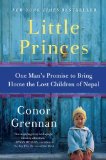Summary | Excerpt | Reading Guide | Reviews | Beyond the Book | Readalikes | Genres & Themes | Author Bio

One Man's Promise to Bring Home the Lost Children of Nepal
by Conor Grennan
I was the last to arrive for daal bhat. I entered the dining area, a stone-floored room with two windows and no furniture save a few low bamboo stools reserved for the volunteers. The children sat on the floor with their backs against the wall, Indian style. They were arranged from youngest to oldest, right to left against three walls of the room. As they waited patiently for their food to be served, I got my first good look at them.
I counted eighteen children in total, sixteen boys and two girls. Each child seemed to be wearing every stitch of clothing he or she owned, including woolen hats. I had not worn a hat to dinner and was already regretting it. The house had no indoor heating and I could practically see my breath. Most of their jackets and sweaters had French logos on them, as the clothes were mostly donations from France. I studied their faces. The girls were easy to identify, as there were only two of them, but the boys would be more difficult to distinguish. A few really stood out - the six-year-old boy with the missing front teeth, the boy with the Tibetan facial features, the bright smile of another older boy, the diminutive size of the two youngest boys in the house. But other¬wise, the only identifying features to my untrained eye would be their clothes.
Before daal bhat was served, Sandra asked the children to stand and introduce themselves, beginning with the youngest boy, Raju. He was far more shy now than when he had been clinging to my face. The other boys whispered loud encouragements to him to get up, and his tiny neighbor, Nuraj, dug an elbow into his ribs. Finally he popped up, clapped his hands together as if in prayer, the traditional greeting in Nepal, said "Namaste-my-name-is-Naju" and collapsed back into a seated position flashing a proud grin to the others. The rest of the kids followed suit, until it had come full circle back to me.
I stood up and imitated what they had done and sat back down. They erupted in chatter.
"I do not think they understood your name," Sandra whispered to me.
"Oh, sorry - it's Conor," I said, speaking slowly. I could hear a volley of versions of my name lobbed back and forth across the room as the children corrected one another.
"Kundar?"
"Hoina! Krondor ho! Yes, Brother? Your name Krondor, yes?"
"No, no, it's Conor," I clarified, louder this time.
"Krondor!" they shouted in unison.
"Conor!" I repeated, shouting it.
"Krondor!"
One of the older boys spoke up helpfully: "Yes, Brother, you are saying Krondor!"
Trust me - I wasn't saying "Krondor." The children were staring earnestly at my lips and trying to repeat it exactly.
"No, boys - everybody - it's Conor!" This time I shouted it with a growl, hoping to change the intonation to a least get them off Krondor, which made me sound like a Vulcan.
There was a surprised pause. Then the children went nuts. "Conor!!" they growled, imitating the comical bicep flex I had performed (instinctively, I'm sorry to say) when I shouted my name.
"Exactly!" I said, pleased with myself.
Sandra looked around and nodded in approval. "I think you will get along with these children very well," she predicted. "Okay, children, you may begin," she said, and the children attacked their food as if they hadn't eaten in days. They spent the rest of dinner with mouths full of rice and lentils, looking at each other and growling "Conor!!!" flashing their muscles like tiny professional wrestlers.
There was no way to keep up the blistering pace set by the kids when they ate. They had literally licked their plates clean when I was maybe half finished. I would have to concentrate in the future. No talking, no thinking, just eating. There was far too much food on my plate, albeit mostly rice. The worst part about it was that I couldn't give the rest of mine away, since once you touched your food with your hands it was considered juto, or unclean, to others. The very idea of throwing away food here was unthinkable, especially with eighteen children watching you, waiting for you to finish. I force-fed myself every last grain as fast as I could, guiltily replaying scenes from my life of dumping half-full plates of food into the trash.
Excerpted from Little Princes by Conor Grennan. Copyright © 2011 by Conor Grennan. Excerpted by permission of William Morrow. All rights reserved. No part of this excerpt may be reproduced or reprinted without permission in writing from the publisher.
Your guide toexceptional books
BookBrowse seeks out and recommends the best in contemporary fiction and nonfiction—books that not only engage and entertain but also deepen our understanding of ourselves and the world around us.